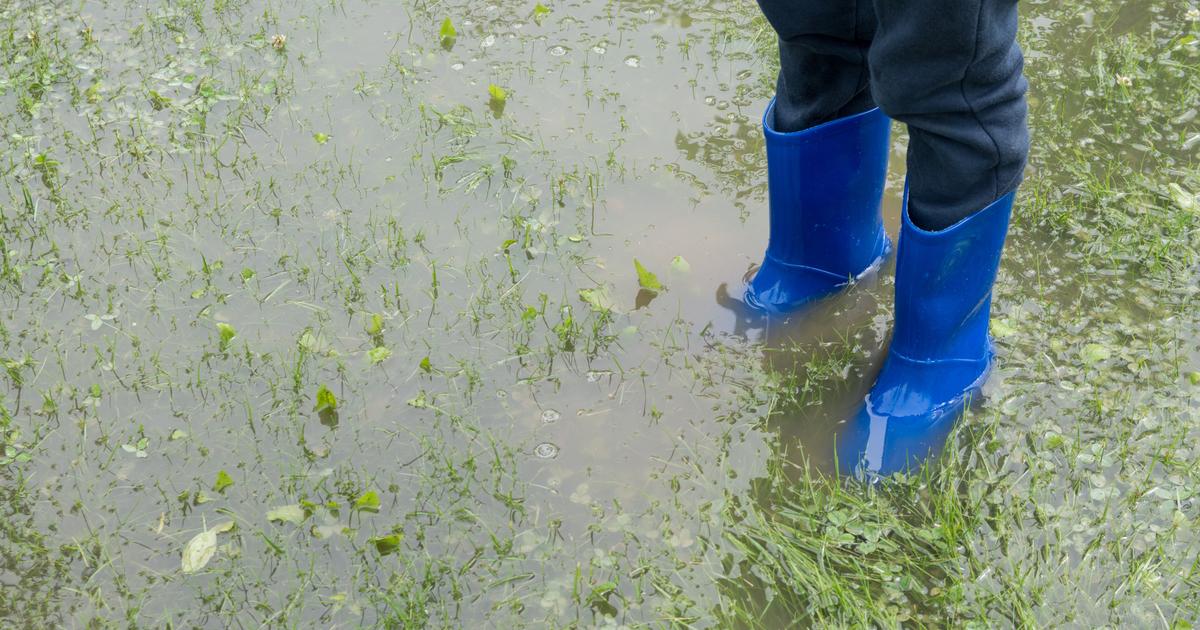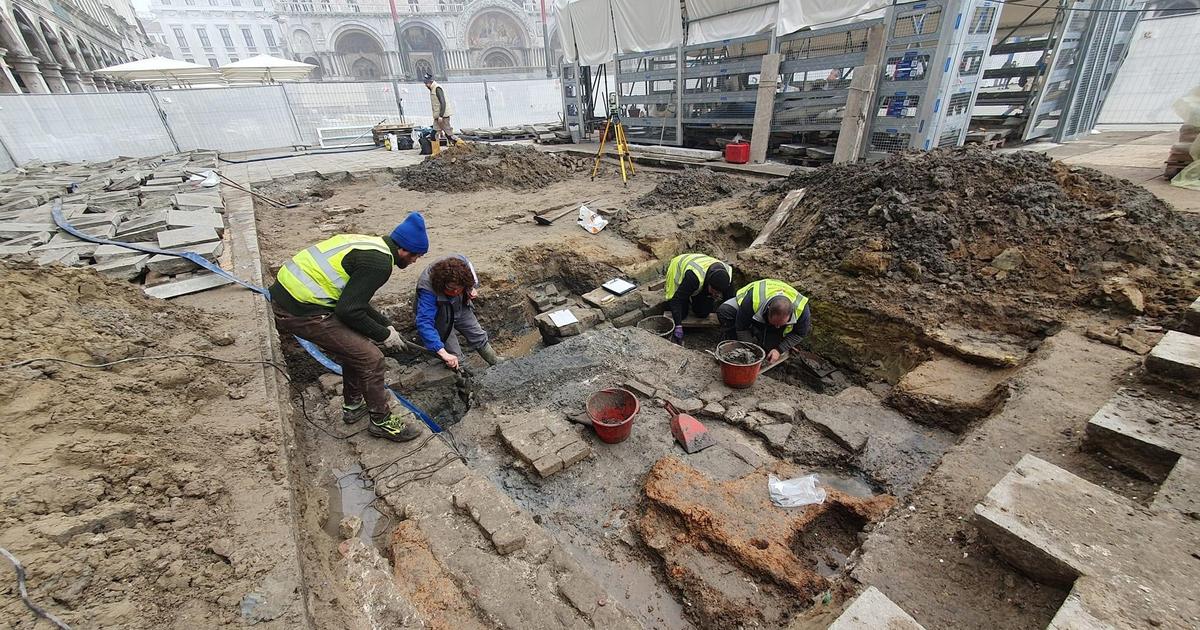As the level slowly drops, Mazzi P. opens the front door of Zattere 561 in the Venetian district of Dorsoduro. Here in the corner house has a friend, Valeria Asquini, her apartment. In the past week he has saved the old lady, the worst flood in the lagoon city since 1966 drove them out. Now he gets her a few things from the damaged rooms.
On Catastrophic Tuesday, the 88-year-old sat motionless on the floating sofa in her ground floor apartment, only a candle was burning on the coffee table. The water rose rapidly within minutes - and with him the sofa and the old lady. "This storm was extremely strong, I was almost terrified," says the narrow late fifties.
photo gallery
14 pictures
Venice: Flood goes, damage remainsThree times within a week, the flood hit the citizens of Venice, the last on Sunday. They are angry, scared, desperate. Even Mazzi P., who does not want to see his full name in the media, is angry. "The Storm Warning Office should have predicted this tidal wave," he says. He wonders why it did not happen anymore. There must be a superordinate body of several countries, in which scientists jointly evaluate their data. "We need transparency!"
Could that have prevented the effects of the storm? Mazzi has no answer, resignedly adding: "We need a different tourism, away from the masses." He remains silent and then quotes a sentence based on "The Leopard" by Tomasi di Lampedusa: "Everything changes and stays as it is." The clouds are bursting open, the evening sun bathes the long Zattere Promenade in a warm golden light.
A little further along the I Gesuati church, Mazzi P. points to some concrete remains on the paved foundation that vaguely indicate a quadrangle. "This was the Chioschetto of Walter Muti, a small green and very popular kiosk.Walter left the house on Tuesday in the biggest storm," says Mazzi P. "Only three minutes later came a giant wave and took the whole sales booth with you more was found by crowdfunding, trying to raise 10,000 euros for its new existence - 25,000 euros came together. "
At the Punta Dogana, the waves have broken mortar from walls, whole stones from the thickly walled parapet railing to the canal. They pushed open the heavy, iron gates along the entire shore of Zattere bringing sand, garbage and chaos. In St. Mark's Basilica, the flood damaged floor mosaics and some marble columns. Much would only become visible in the coming months, when everything has dried again, says Pierpaolo Campostrini of the Marquis, according to media reports. The harmful effect of sea salt is "slow but inexorable".
"Not a city, but an idea"
"That was la tempesta per-fet-ta , the perfect storm," says Alessandro Vitturi, emphasizing every syllable. The 57-year-old stands at the counter of the Hotel Il Palazzo Experimental on the Zattere waterfront. Outside, the wide Giudecca Canal separates the Dorsoduro district from Giudecca Island, where Vitturi lives in one of the more modern apartments.
"The full moon, the Scirocco with the 100 km / h, the Tidenhub - taken together it was like a jackpot Eccezionale! I was really scared," he says about the water level of 187 centimeters from last Tuesday and ordered another "Vesper" , the famous cocktail named after Vesper Lynd, Lady of the Heart of James Bond from the Venice Royale movie (2006).
Vesper was born on a stormy evening, writes Ian Fleming. Later, the author lets his heroine commit suicide in the floods of the historic city - perhaps a symbol of today's Venice? The city, which is threatened not only by climate change, but also by an influx of visitors, which is deliberately, but not rationally steered.
Alessandro Vitturi works as a porter in a research and cultural institute near the Accademia Bridge. He can remember the year 1966 and the horrors of the 194-centimeter flood, although he was only four years old then. "Venice is not a city, but an idea," he says. A dream city, which is overtaken by the reality.
Next to Vitturi is Florian Maier, 28, from Tübingen. For three years, the German manager lives near the Rialto Bridge. "As the water continued to rise, there was a ghostly calm despite the storm, no one spoke more, no one to be seen, I've never seen it here, only a few water taxis were still on the way," he says.
No room to dodge
The Venetians are exhausted after the constant alarm, from water pumping, from wiping, from cleaning - and from the concern for existence. "No one is allowed to live on the ground floor because of the danger, only shops are allowed," says the owner of the tiny, fully stocked Nadia boutique on Calle Lotto. She has deep dark circles, seems worn out. Nevertheless many live at ground level, where should they go in the crowded city? Some accommodations are tiny, basement does not exist. No room to dodge.
The specially arrived flood tourists, however, stalked through the puddles like birds during the flood, photographing each other as if it were all a joke. Around the Accademia Bridge supermarkets and kiosks sold rubber boots and thin, bright-colored disposable overcoat during the high water days. About eight euros cost a pair of knee-high stivali da pioggia that you just pull on the shoes. Later, the plastic tubes floated in the water over bridges and squares.
In one of the functional salopette , waders, as anglers and now the Venetians wear them, a man was standing on the square Rio Terà dei Catecumini on Sunday. Slowly he turns around to himself. "I photograph the downfall of my city as a 360-degree panorama. Che gross! How horrible!"
The water did not rise so fast and so high in the past. "As a citizen of my city, I think we will not survive more than five years," he says. The man is a teacher of a local high school and 68 years old. "With the dredging of canals for big steamer and mass tourism, Venice has dug its own pit, the deep canals bringing first the tourists, then the flood, all for the sake of money, economic interests."
He stands in the knee-deep water and says: "We are paralyzed in the financial profit striving, Europe must save us, we are not in the position to do so, and the flood control station Moses should have been finished five years ago." Then the teacher continues towards Giudecca Canal.





